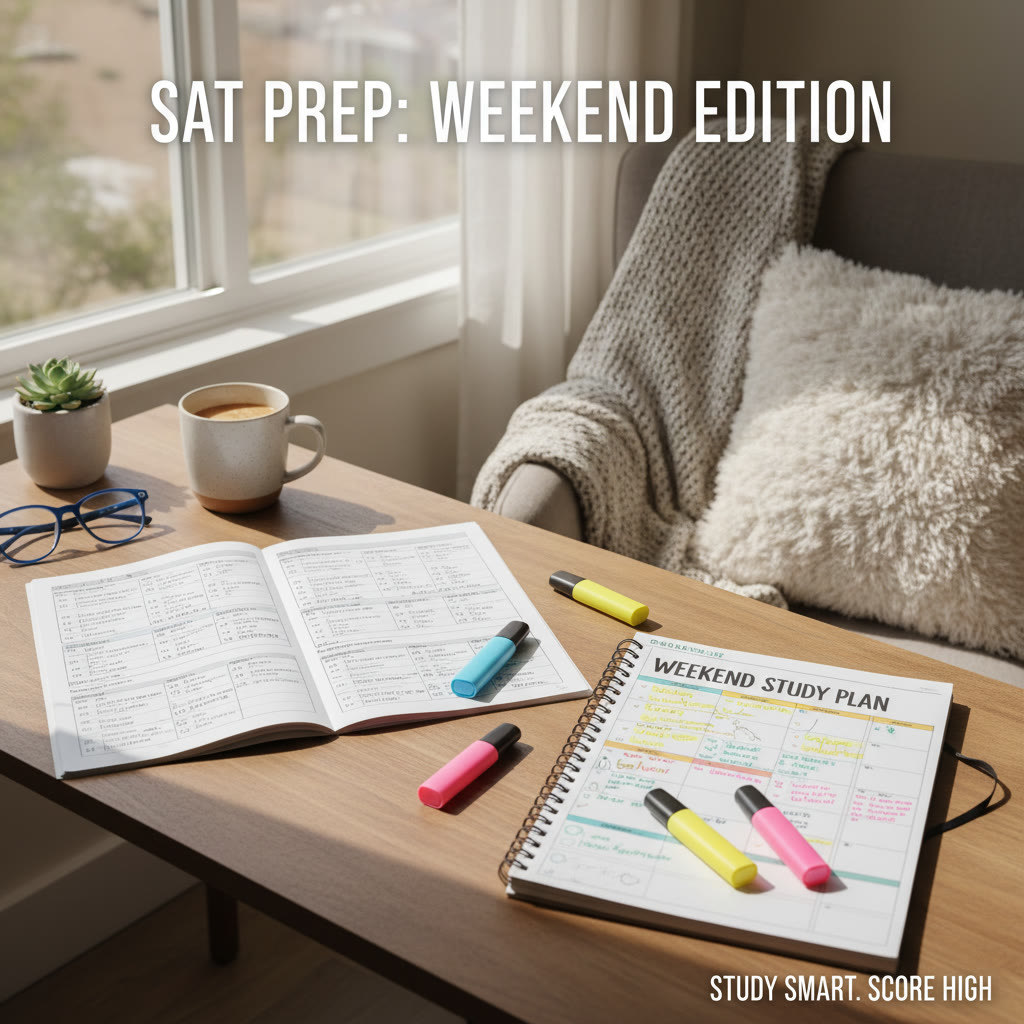Why Weekends Matter More Than You Think
Weekends are the secret power-up for SAT preparation. During the week, school, activities, and homework slice your day into scattered pockets of time. But weekends give you two consecutive days where your schedule is (usually) under your control. If you use that time intentionally, you can do concentrated practice, simulate test conditions, and make plans that weekday hours simply can’t accommodate. This post gives you a warm, practical guide to designing weekend study sessions that leave you energized, confident, and measurably better.

Start With a Weekend Mindset, Not a To-Do List
Before you open a single practice test, take five minutes to adopt the right mindset. The difference between busy and productive is intention. Busy feels like many tasks checked off; productive feels like forward movement on your main goal. Ask yourself:
- What one measurable improvement do I want by Sunday night? (e.g., cut Reading time by 10 minutes per passage, reduce careless errors in Math, increase raw practice score by 30 points)
- Which weaknesses are blocking bigger gains? (timing, specific content gaps, test stamina)
- How will I recover so I don’t burn out? (planned breaks, social time, exercise)
Write your answers down at the top of your weekend plan. That short clarity exercise transforms aimless study into targeted work.
Designing Your Ideal Weekend: Principles That Work
1. Balance Intensity With Recovery
Two long marathon sessions back-to-back usually produce diminishing returns. Aim for a rhythm: focused intensity for 90–120 minutes, then a 20–30 minute active break. Repeat. That gives your brain time to consolidate and prevents fatigue-induced mistakes.
2. Alternate Skills and Modes
Rotate between reading, writing, math, timed sections, and review. Alternating keeps your focus sharp and trains the stamina to switch gears during the real test.
3. Make One Session Diagnostic, One Session Remedial
Use one block for a full or sectional timed practice to reveal current weaknesses. Use the next block to drill specifically on those weaknesses—targeted practice beats random exercises.
4. Keep Evidence, Not Just Effort
Track actual metrics: time per passage, error types in math (algebra vs geometry), sections where you lose time. Numbers let you measure progress objectively and iterate your plan.
A Sample Weekend Playbook (Workable for Busy Students)
Below is a balanced and realistic two-day template you can adapt. If you prefer mornings or are stronger at night, swap the blocks. The key is consistency and purposeful rest.
| Time | Saturday | Sunday |
|---|---|---|
| 8:00–9:30 AM | Warm-up: Review error log + vocab flashcards (45 min), light practice section (45 min) | Full timed Practice Test (Sections 1–3 or full test if time allows) |
| 9:30–10:00 AM | Active break: walk or stretch | Break / recovery |
| 10:00–12:00 PM | Deep math block: targeted drills + untimed problem review | Timed section review: error mapping and concept drills |
| 12:00–1:00 PM | Lunch and rest | Lunch and light activity |
| 1:00–2:30 PM | Reading comprehension: timed passages + strategy focus | Essay or Writing & Language focus (if applicable), plus grammar drills |
| 2:30–3:00 PM | Break: snack, phone check | Break |
| 3:00–4:30 PM | Mixed practice: one timed section, immediate review | Targeted practice on weakest area from Saturday |
| 4:30–Evening | Light review, plan for Monday, unwind | Reflection: record progress, plan next weekend |
This table is a template—not a rule. If you’re juggling sports or a job, compress blocks (e.g., 45/15 minute rhythm) and keep the diagnostic + remediation pattern.
Concrete Techniques for Each Block
Warm-Up (15–45 minutes)
Start with something quick that raises confidence. A warm-up can be five vocabulary flashcards, a single mixed problem set, or reviewing the previous week’s error log. The objective is to prime the brain and reduce start-up friction.
Timed Practice (One Section or Full Test)
Simulate test conditions: quiet, timed, minimal distractions. Use a real practice test or a realistic section. Don’t pause to look up answers during the section—collect errors and move on. After finishing, wait 10–15 minutes and then begin review with fresh focus.
Targeted Drill Sessions
Identify the specific types of problems that cost you points (e.g., algebraic manipulation, inference in reading, commas and clauses). Drill those problem types for 40–70 minutes in focused blocks. Use immediate feedback: mark what you got wrong and write a one-sentence rule for each mistake.
Review and Error Mapping
Don’t just re-solve problems. Categorize every error by type and by cause: content gap, misread, silly arithmetic, time pressure. Create a short action plan for each error type. For example, if you repeatedly forget the quadratic formula steps, schedule a 20-minute review and five practice problems focused solely on quadratics.
How to Use Breaks to Your Advantage
Breaks are not wasted time—they’re part of learning. Active breaks that include movement or a mental shift are best. Walk, stretch, hydrate, or prepare a healthy snack. Avoid doom-scrolling on social media; it fragments attention. A good rule: 90–120 minutes focused work, 20–30 minutes active break.
Nutrition, Sleep, and Energy Management
Two weekend days won’t fix chronic sleep debt. Aim for consistent bedtimes and enough sleep, especially the night before a simulated full test. On test-practice days, fuel with protein and complex carbs for steady energy. Avoid heavy, greasy meals before a long practice session—you risk post-lunch fatigue.
Quick Energy Checklist
- Breakfast: protein (eggs, yogurt) + whole grains
- Snacks: nuts, fruit, hummus and veggies
- Hydration: water throughout the day
- Avoid excessive caffeine; use small doses earlier in the day if you normally consume it
Using Data: Track What Actually Changes
Progress feels like a slow climb unless you track it. Keep a simple log each weekend entry with these fields:
- Date and duration of session
- Practice type (full test, math drills, timed reading)
- Score or mistakes
- Top three takeaways
- One action item for next weekend
After four weekends, you’ll have clean trends: which strategies improve timing, which drills actually reduce errors, and where you still plateau. Those trends are gold. Sparkl’s personalized tutoring and AI-driven insights can help interpret these trends, turning a raw error log into a tailored plan that accelerates improvement.
Sample Study Blocks With Specific Exercises
Math Deep Work (90 minutes)
- 20 minutes: timed practice on algebra problems
- 20 minutes: review incorrect problems, annotate each error with a cause
- 20 minutes: targeted drills on the most common error type
- 20–30 minutes: mixed set of medium-difficulty questions to build stamina
Reading Comprehension Focus (75–90 minutes)
- 15 minutes: quick strategy review (active reading markers, passage mapping)
- 40 minutes: two timed passages with full answer explanations
- 20–35 minutes: targeted practice on inference or evidence questions
Writing & Language and Grammar (45–60 minutes)
- 15 minutes: rule review for comma usage and sentence structure
- 20–30 minutes: timed section practice
- 10–15 minutes: error-type tally and one corrective exercise
Adjusting the Weekend for Different Goals
Not all students have the same priorities. Here are tweaks based on typical scenarios.
If You Need a Big Score Jump Fast
- Focus on high-leverage topics (commonly-tested math concepts, question types that cost many points).
- Do more full or sectional timed practice to build endurance.
- Work with a tutor for two targeted sessions a month—Sparkl’s 1-on-1 guidance and expert tutors can zero in on persistent weaknesses and create a tailored study plan that multiplies practice efficiency.
If You Have Little Time During the Week
- Compress drills into focused morning sessions on weekends and use two 25–30 minute weekday mini-blocks for review.
- Use practice tests every other weekend and dedicated remediation the weekends between.
If You’re Already Strong But Need Consistency
- Rotate between full sections and high-difficulty practice to maintain skill and avoid complacency.
- Use weekend sessions for polishing timing and reducing careless errors.
How Personalized Tutoring Fits Into Weekend Optimization
Self-study is powerful, but it often plateaus because habits and blind spots persist. This is where occasional expert input accelerates progress. A personalized tutor can:
- Analyze your weekend logs and point out patterns you miss (e.g., consistent fatigue after a certain time)
- Create a tailored weekend schedule that fits your life and targets the highest-leverage improvements
- Offer 1-on-1 guidance during a problem review so misconceptions get corrected immediately
Sparkl’s personalized tutoring pairs expert tutors with AI-driven insights to identify trends in your performance and suggest focused weekend priorities. Think of a tutor as the coach who helps turn disciplined practice into noticeable score gains.
Common Pitfalls and How to Avoid Them
- Overloading: Cramming full-length tests on both Saturday and Sunday leads to burnout. Mix practice with review.
- Passive Review: Simply re-reading answers doesn’t stick. Explain mistakes to yourself or a tutor in one sentence.
- Ignoring Timing Problems: If timing is an issue, do more timed sections with enforced pacing rather than only untimed practice.
- Skipping Reflection: Without a weekly log, you’ll repeat the same mistakes. Write one takeaway per study block.
Measuring Progress and Celebrating Wins
Progress on the SAT is often incremental. Celebrate small wins: a passage finished in less time, a full math section with fewer careless errors, or a consistently improving practice test score. Use the data to update your weekend plan: if you see steady gains in one area, shift time to the next bottleneck.
Real-World Weekend Example: From Busy Junior to Confident Test-Taker
Meet Maya, a junior with soccer on Saturday mornings and part-time work on Sunday afternoons. Her goals: +80 points in three months. She adopted these rules:
- Saturday evening (after practice): 60 minutes of targeted Math drills and 20 minutes of error logging.
- Sunday morning: full timed section, review in the afternoon with her tutor, and one small stamina exercise (two mixed timed passages).
- Weekly check-in every Sunday evening to adjust priorities.
Within six weekends, Maya cut time-per-reading-passage by 15% and reduced silly math errors by using focused review. The combination of targeted weekend work and an occasional tutoring session kept her momentum steady without burning out.

Quick Tools and Resources to Make Weekends Easier
Equip your weekend with a few reliable tools: a dedicated practice test book (official practice tests are best for realism), a simple timer (phone timer or a physical kitchen timer), a notebook for an error log, and a distraction-free study zone. If you use digital platforms for practice, ensure you can export results for week-to-week tracking. Remember that a short tutor session focused on your weekend diagnostics can multiply the impact of your practice.
Final Checklist for Your Next Weekend
- Define one measurable weekend goal.
- Create a realistic schedule with diagnostic and remediation blocks.
- Pack healthy snacks and plan sleep times.
- Plan breaks and a recovery strategy for the evening.
- Record your results and pick one action item for next weekend.
- Consider a 1-on-1 session with a Sparkl tutor to sharpen the plan if you hit a plateau.
Parting Thought: Progress Is a Weekend at a Time
Optimizing weekends is less about squeezing every spare minute and more about designing meaningful, measurable practice. With clear goals, targeted drills, consistent review, and smart recovery, your weekends can transform from chaotic cram sessions into the engine of steady improvement. If you blend self-discipline with occasional expert guidance—like tailored plans from Sparkl and the focused coaching of an expert tutor—you’ll find the path to your target score becomes both clearer and faster. Keep going, schedule it, and enjoy the process. Two focused days can change the arc of your SAT preparation.


















No Comments
Leave a comment Cancel